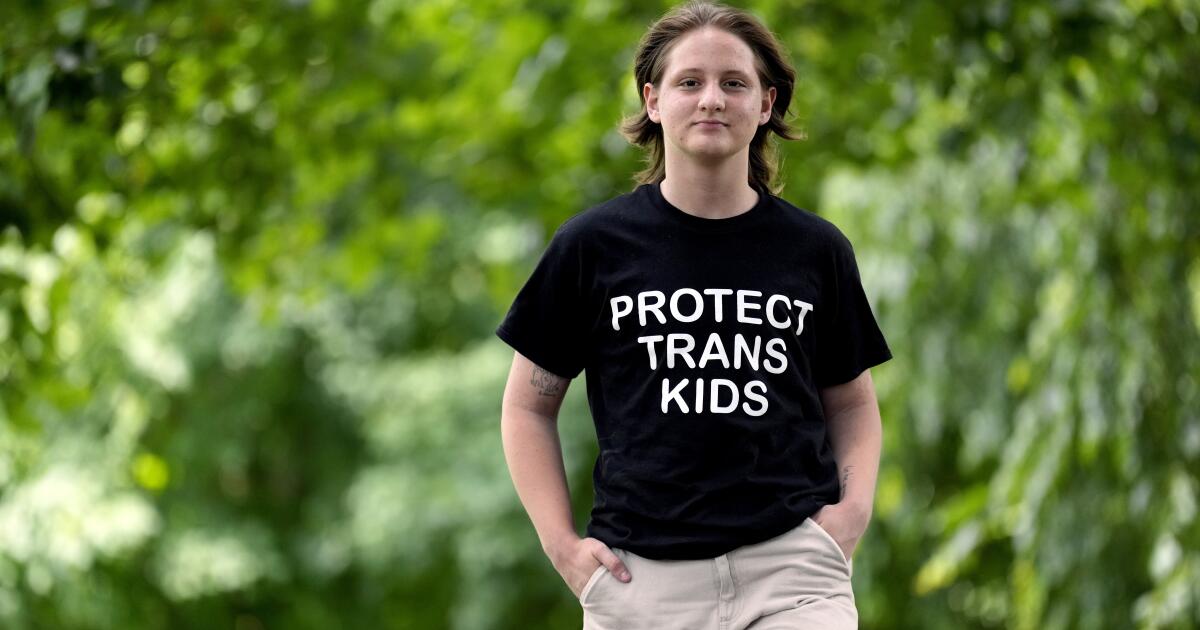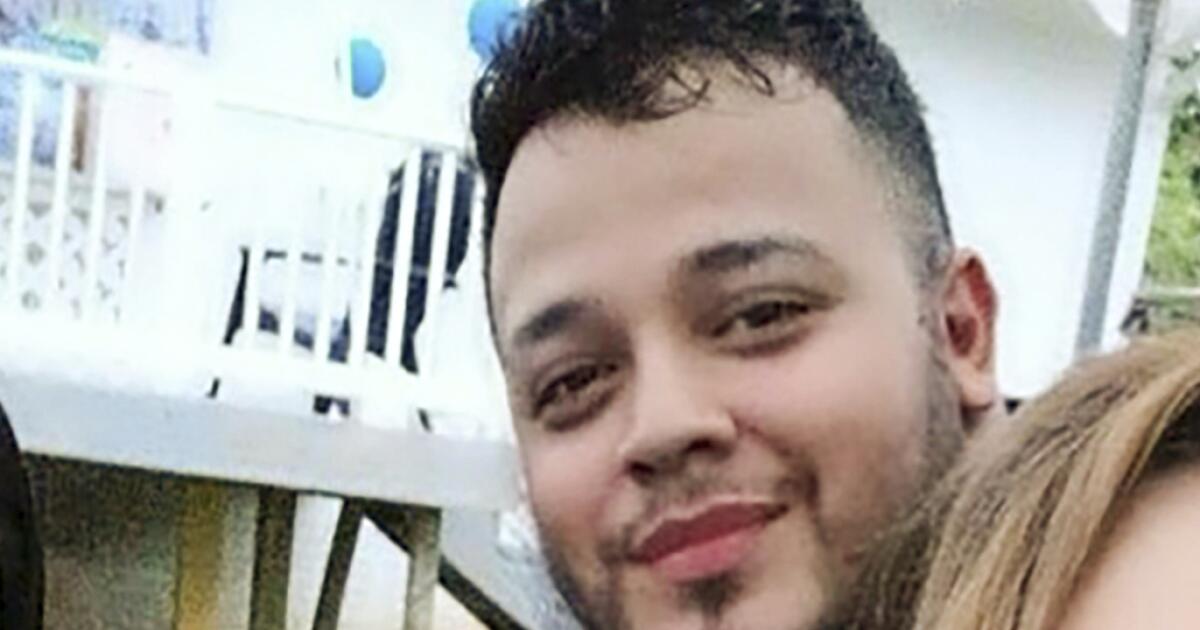Candace Parker: From top prospect to WNBA champion with three teams
In 2000, whispers of a 13-year-old phenom from Naperville, Ill. — a Chicago suburb — began reverberating through the AAU circuit. Generational. Dominant. Striking. Perhaps the greatest women’s basketball prospect ever. Candace Parker’s name rang out far beyond her hometown.
Word soon reached every elite college basketball program in the country — from Durham, N.C., to College Park, Md., to Knoxville, Tenn. — each clamoring for her talents. Few truly stood a chance.
“Her game at such an early age was something I had never seen in person,” said Nikki Fargas, then an assistant coach at Tennessee. “To see her do it so young tells you a lot. … She was undeniable, and her presence was felt.”
Long before Parker’s illustrious professional career and her Sparks jersey retirement ceremony Sunday — three championships, two MVPs, rookie of the year, defensive player of the year, Finals MVP, two Olympic golds, seven All-Star nods and 10 All-WNBA selections — she was simply “Ace,” a sweatband-wearing, bob-cut sporting teenager set to graduate.
Fargas, who won a national title under legendary coach Pat Summitt, was Tennessee’s recruiting director in 2003 and was looking to make a splash with her first class. The moment she saw Parker in person, she was certain: Parker would be a Lady Vol.
By her senior year in high school, Parker had grown into a 6-foot-4 national player of the year and state champion.
Candace Parker was considered one of the top college recruits while at Naperville Central High in a suburb outside of Chicago.
(Anne Ryan / Associated Press)
Fargas attended all of Parker’s games at Naperville Central High, a nearly 1,100-mile round trip. She sat in the Redhawks’ gym bleachers, decked out in Tennessee orange while sending a not-so-subtle message, often with Summitt by her side.
Fargas made her final pitch clear and direct: Parker could become the greatest under Summitt.
Joining Rocky Top
On Nov. 11, 2003, at the start of her senior year, Parker committed to Tennessee live on ESPNews — the first women’s basketball player to commit on national TV. Parker later told ESPN, “I wanted to be a professional basketball player. I loved that Knoxville was centered around women’s basketball.”
“Candace is the most versatile 6-foot-3 player at this stage of her game that I’ve ever seen,” Summitt said in a Tennessee news release announcing Parker’s signing a letter of intent. “She can play every position on the floor, from point guard to post, … Truly a great inside-outside player. … The total package.”
Parker’s arrival sent a jolt through Rocky Top. At just 18, she brought weighty expectations — it was championship or bust. For several years, it had been bust for Tennessee, which hadn’t won a national title since the late ’90s.
After missing her freshman year because of a knee injury, Parker proved to be better than advertised, propelling the Lady Vols back onto the national stage.
“Even in college, not only did she dunk, but she was able to pass, able to shoot at her position, able to do things that bigs weren’t doing,” said Noelle Quinn, a former Southland prep star and head coach of the Seattle Storm. “It was easy for Candace. It was easy for that team.”
Tennessee coach Pat Summitt gives instructions to Candace Parker during the 2007 NCAA title game against Rutgers.
(Tony Dejak / Associated Press)
Quinn experienced the Summitt-Parker era firsthand. In 2006, she led UCLA into an early-season clash on the road against No. 1 Tennessee — the start of Parker’s first title run.
“It was an amazing environment to play in — a game I’ll never forget,” Quinn recalled. Parker and Quinn led their teams in scoring — Parker with 22 points, Quinn with 20. Tennessee’s dominance with Parker at the helm was clear, Quinn said.
At the height of the team’s back-to-back championship runs, Fargas said traveling with the Lady Vols “was like traveling with rock stars.” Summitt’s fearless approach — taking on anyone, anywhere — kept Tennessee in the spotlight, with Parker as the undisputed headliner.
“What we’re seeing right now with Angel Reese and Caitlin Clark — bringing awareness, getting people to watch and increasing attendance — Parker was doing that already,” Fargas said. “Fans would be lined up at our hotel. Our bus would pull up and there were the fans.”
By the end of her college career, Parker had accomplished everything — two-time AP player of the year, 2008 Naismith college player of the year, and most outstanding player during both national title runs — the last of which was Summitt’s final championship.
“She fits in at the top,” Fargas said of Parker’s place in program history. “When you talk about Lady Vols, Parker is maybe the first of the names people talk about. … She was different.”
Big L.A. dreams
Parker was arguably the WNBA’s most anticipated prospect — a franchise-altering talent. Yet one question loomed: Who would land her?
In 2006, the Sparks were in championship contention, reaching the conference finals with MVP Lisa Leslie. But when Leslie missed the following season on maternity leave, the team plummeted to 10–24 — tied for worst in the league.
With a 34.1% chance at the No. 1 pick, the pingpong balls bounced the Sparks’ way.
Candace Parker, left, and Lisa Leslie crack jokes as they check their height at a Sparks photo shoot in 2008.
(Damian Dovarganes / Associated Press)
Questions swirled about how Parker and Leslie would coexist. Leslie says she never saw a problem — only potential. She called herself “Smooth” and Parker “Silk,” and welcomed the role of hardening the rookie, likening it to “having another baby.”
For a time, Leslie lived a few floors from Parker in the team’s player housing, keeping tabs on Parker’s habits. She’d make her oatmeal and slice up fruit because Parker “wouldn’t eat well,” gently pushing through rookie stubbornness toward authority, nudging her toward the weight room and stressing the importance of body maintenance.
The wisdom of one MVP — and the freedom granted by Sparks coach Michael Cooper — helped ignite the greatest rookie season in WNBA history. Parker captured both rookie of the year and MVP honors, joining an exclusive club with NBA legends Wilt Chamberlain and Wes Unseld.
“Candace always showed greatness,” Leslie said. “Each generation, we’ve done our part. You carry that torch as far as you can, and hand it off with grace.”
The torch was Parker’s to bear into the next decade. But nine seasons in, she was still chasing her first Finals appearance, let alone a championship. Years of coaching changes, early playoff exits and unmet expectations had left the franchise — and its star — without a title.
Brian Agler’s first year as Sparks head coach started rocky with a 3–14 record, as Parker sat out the first half of the 2015 season after playing overseas. As the losses mounted, Parker prepared for a return and called Agler to arrange a closed workout.
“I think she wanted to play into me as, ‘OK, I’m gonna come back and get ready,’” Agler said. “But in reality, she was sort of measuring me up.”
Agler believed it was a test to see whether she thought he was the right fit — if he could lead the team to a championship, just as he had done with the Seattle Storm in 2010.
Sparks forward Candace Parker drives past Lynx forward Rebekkah Brunson during a game in 2012.
(Stacy Bengs / Associated Press)
By the following season, with the pieces in play, contending for a championship seemed within reach. But the 2016 season wasn’t without turmoil for Parker. She was surprisingly left off the USA Olympic team, faced marital strife and mourned the loss of Summitt, who died of complications from Alzheimer’s.
On the court, Parker remained a force, and helped foster the rise of one of the league’s best — former No. 1 overall pick and MVP Nneka Ogwumike. Like Leslie had done for her, Parker took Ogwumike under her wing.
“For the most part, I was someone who paid attention to what vets did, and I spent a lot of time watching what she did,” Ogwumike said of Parker. “She helped me understand [the game] from a different lens, from a more advanced perspective coming in from college. We were able to develop some great chemistry.”
Agler said their connection “was as special as I’ve seen,” adding that Ogwumike “probably understood Candace better than most anybody.”
In Parker’s first WNBA Finals, she led the Sparks through a dramatic series against the Lynx, capped by a 28-point and 12-rebound performance in Game 5 to secure the title and Finals MVP.
Through tears, she found the only words she could muster: “This is for Pat.”
“I’m sure it [the pressure] was there for her,” Agler said. “I just remember when we won, how happy she was. She almost collapsed on the floor with joy. … That’s really the only time I’ve seen her that way in a public setting.”
Soon after the championship run, a divide grew between Parker and the organization. In her new book, “The Can-do Mindset,” Parker reflects on strained relationships with the front office, a carousel of head coaches and a growing distrust that ultimately fractured her relationship with the Sparks.
“The culture was toxic, and whether I wanted to admit it or not, I was a part of that culture and had been absorbed in that toxicity,” Parker wrote in her book, referring to the breakup. “I had to admit to myself that I didn’t like who I’d become in my years with the Sparks. It takes two to tango. So though I didn’t create the culture, I was still at fault in my own way.”
Chasing more titles and ownership
Candace Parker, center right, celebrates with Chicago Sky teammates after winning the 2021 WNBA title.
(Paul Beaty / Associated Press)
After 13 years, Parker decided to leave the Sparks. It’s a move Leslie called “unfortunate,” adding she had “no idea how they let her get away.” But Parker announced she was ready to find “a sense of peace,” signing with the Chicago Sky — moving as close to her native Naperville as possible.
During free agency, Parker called Azurá Stevens, who had just wrapped her first season with the Sky. Curious about the team and open to a fresh start, Parker asked about Stevens’ experience. Stevens still describes the conversation as “surreal,” thrilled by the idea of sharing the court with her childhood idol.
Growing up, Stevens — now the Sparks’ starting forward — modeled her game after Parker. Standing 6-foot-6, she admired Parker’s versatility and poise, and now, the two would be teammates in the same starting lineup.
“We had an up-and-down year and went through a lot that season,” Stevens recalls of the team finishing .500. “Candace definitely led the way. … A strong veteran presence for us to keep us level-headed. And once we got to the playoffs, we flipped the switch.”
Seattle Storm guard Lexie Brown — like Stevens — followed Parker’s career. Finally playing alongside her in Chicago, what stood out wasn’t just Parker’s talent, but her relentless devotion while juggling motherhood, a broadcasting career and a championship run. “I remember watching her on TNT the night before, and she’d pull up to practice with some of her makeup still on,” Brown said. “She was really dedicated to helping us win. That was a special season for me.”
In the twilight of her career, Parker still showed flashes of the once baby-haired assassin who shook up the WNBA.
“It was a homecoming for the whole year,” Stevens said of Parker’s move to Chicago. “Being able to go back home and then bring a franchise its first championship is really special. The city really showed out for her.”
After two seasons in Chicago, Parker decided to reunite with Fargas — the coach who recruited Parker to Tennessee and eventually became president of the Las Vegas Aces.
With a championship pedigree and legacy to match, Parker’s new role was no longer the star but the connector. Her signing was meant to elevate A’ja Wilson, Kelsey Plum and Jackie Young — all former No. 1 picks — to their fullest potential.
“She brought a calmness to our team,” Fargas said. “We already had a high-powered offense. … But having her on our team definitely helped raise and bring a championship culture.”
Candace Parker won her third WNBA championship with the Las Vegas Aces in 2023.
(Lindsey Wasson / Associated Press)
The outcome? A third championship with a third different team — another WNBA first.
But the victory came with a bittersweet edge. An ankle injury sidelined Parker for much of the season. “She did everything in her power to get back to us. … I know that was very difficult for her,” Fargas said.
With wear and tear piling up, Parker announced her retirement — opening with a borrowed line from a Jay-Z verse on the track “Dear Summer”:
“Dear Summer, I know you gon’ miss me …”
“I love his lyrics, but I love how he’s redefined what rappers are capable of,” Parker said of Jay-Z during an interview with ESPNW in 2023. “That’s what I hope to do for women’s basketball players. … I want to be that business leader, that business mind.”
Soon after retiring, Parker joined an investment group aiming to bring a WNBA franchise to Tennessee. Billionaire and former Gov. Bill Haslam — now chairman of the NHL’s Nashville Predators — and his wife, Crissy, led the Nashville-based bid. They’ve assembled a star-studded roster that includes Parker, Pro Football Hall of Famer Peyton Manning and country music icons Tim McGraw and Faith Hill.
“When I called her the first time, I said, ‘Candace, we’d love you to be involved, and we don’t just want your name,’” Haslam recalled. “She was really quick to say, ‘Well, that’s great, because that’s the only way I would be involved.’”
With the WNBA set to expand to 16 teams by 2028, the group submitted its formal bid in January. The group proposes calling the team Tennessee Summitt.
“To see Candace join an ownership group — why not?” Fargas said. “Why aren’t there more opportunities for the players who helped shape this league? Why aren’t there those opportunities to allow them to not only play the game, but also invest in it?”



